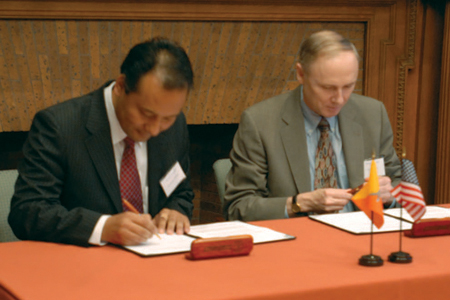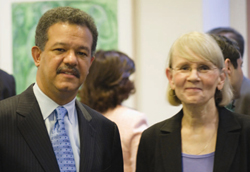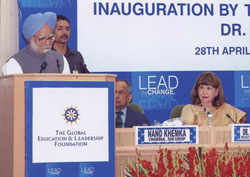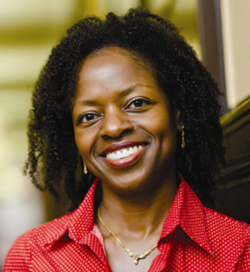TC, Far and Wide
Named to the post in June 2008, Williams has previously worked in the Peace Corps in
“There’s so much history in what TC has already done, from
In August 2008, TC sent a delegation of faculty members and consultants to
The five-day “design retreat” facilitated by the TC delegation was attended by more than 100 prominent Jordanian educators, including Ministry of Education staff and faculty from Jordanian universities.
Work by TC faculty is also continuing apace in
The curriculum—one of the few anywhere that targets high school students—launched in April 2008 at a ceremony in New Delhi, at which TC President Fuhrman spoke, along with India’s Prime Minister, Manmohan Singh. It consists of 12 sessions over the course of a school year and is mandatory for all eighth and ninth grade children at participating schools. Students work on team skills, thinking skills and writing, speaking and listening skills; engage in role-play and exercises that involve moral decision making; learn to identify their own leadership strengths and weaknesses; and discuss the qualities of national and global leaders. They also participate in conflict management workshops, an adventure camp and organic farming, and spend time with street children.
In September 2008, TC hosted a delegation from the Dominican Republic led by President Leonel Fernández, who told the College’s Provost, Thomas James, that “there is an education crisis” in his country.
The delegation had previously visited Columbia Secondary School, a new public school launched by Columbia University that is headed by a TC graduate, Jose Maldonado-Rivera, and employs philosophy and social studies curricula shaped by his former advisor at the College, Professor of Psychology and Education Deanna Kuhn. Known as Education for Thinking, Kuhn’s curricula seeks to instill core skills related to inquiry and argumentation.
At the end of the visit, Fernández asked James for a permanent collaboration with TC in which the College will function as an advisory group to the country, host Dominican interns and help in the founding of small schools like CSS. James pledged the College’s cooperation, saying “if we’re not having an impact out in the world, our work wouldn’t matter, so we’re going to find ways to do this.”
And most recently, in October 2008, TC entered into partnership with
Published Thursday, Jan. 15, 2009



